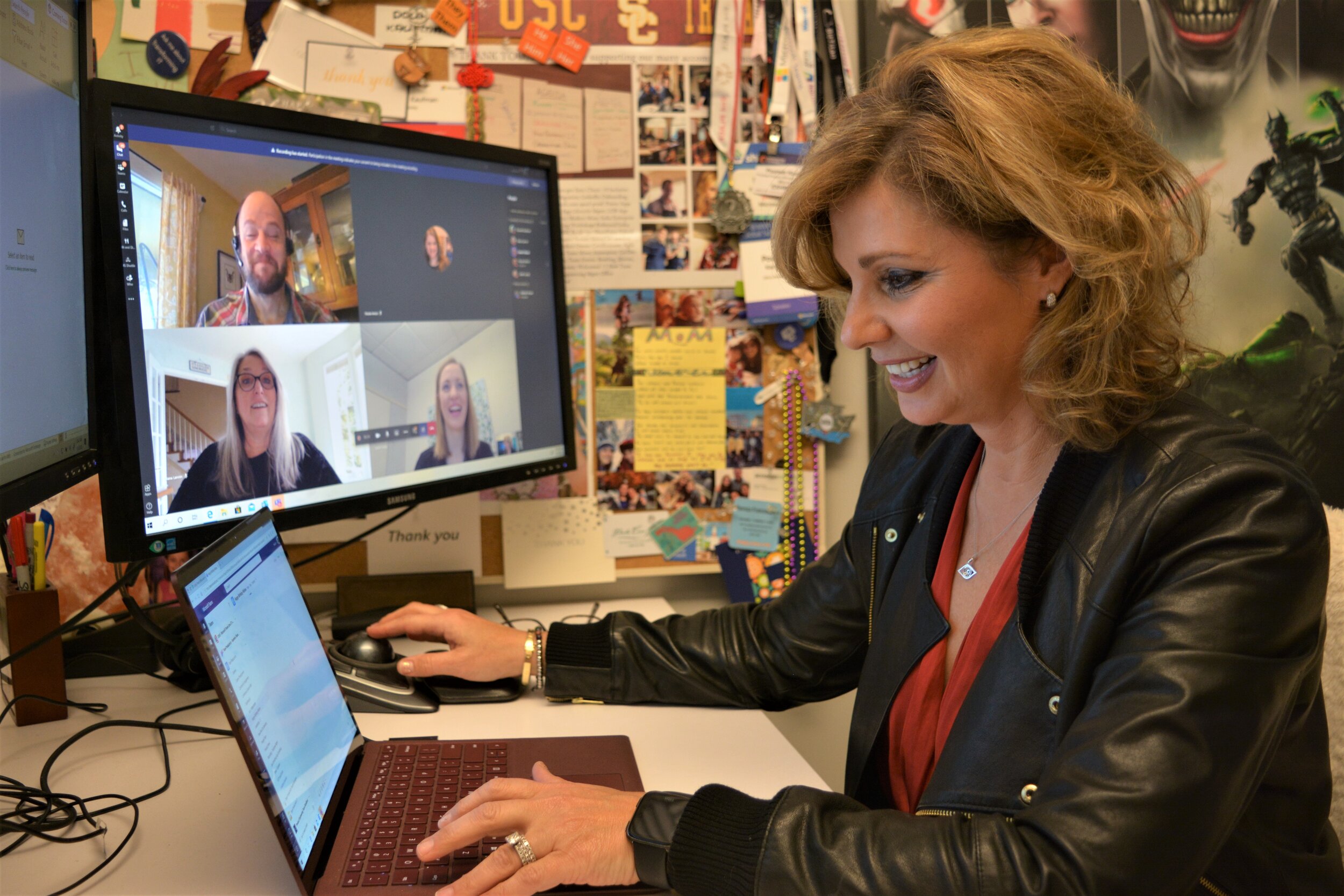Storytelling at Microsoft
As a writer and video producer on Microsoft Inside Track, I told stories about the employees who build, deploy, and maintain Microsoft technology through interview-driven blogs and videos.
Telling the stories of experts who build, run, and maintain the technology that underpins Microsoft
Highlighting the value of storytelling in a business environment through journalistic writing
Advocating for storytelling in a business environment
In an era of remote and hybrid work, everything changed. Many work places, schools, and community organizations had to become tech companies over night and learn to set up systems to support remote meetings, connection, and onboarding.
At Microsoft Inside Track, we told the inside story of how we navigated this transition internally at Microsoft while keeping security and productivity at the forefront of our work. That way, other customers could learn from our lessons and challenges along the way. As a writer and video producer, I told stories about the employees that build, deploy, and maintain Microsoft technology so other corporations can learn from our journey and emulate our work. Our goal was to tell authentic stories which drives adoption and awareness of the company’s products and services.
In this role, I owned end-to-end content creation from pitching stories and identifying sources to being the creative director for the photos and graphics included with each story.
As a writer and video producer, I told stories about the employees that build, deploy, and maintain Microsoft technology so other corporations can learn from our journey and emulate our work. Our goal was to tell authentic stories about what we’ve learned along the way, which drives adoption and awareness of the company’s products and services.
Role: Writer and Video Producer at Microsoft Inside Track | August 2019 - November 2021
Skills: pitching, interviewing, video scriptwriting, on-camera talent coaching, blog writing, corporate storytelling. photography
Responsibilities:
Drove IT pro and customer awareness and adoption of Microsoft products and new features by interviewing engineers and designers and creating written, video, and social content. Contributed to a 25% increase in blog engagement year over year.
Aligned 6 campaigns on security, data and AI, and remote work with upcoming Microsoft events, customer needs, and key messaging from marketing, engineering, and product groups
Led content strategy for video stories by identifying a pipeline of videos, coaching subject matter experts, writing scripts, and appearing as on-camera talent
Empowered experts to take high-quality photos with a consistent look and feel by creating at-home photoshoot guidelines
Finding a career in storytelling
When I first interned at Microsoft, I was on the quest to find someone at Microsoft who made their living as a storyteller. I met with 3 people a week to learn about their day-to-day work and tell them about my dream to have the job title of “storyteller” and not have anyone question it. I eventually met Jen Warnick, an employee who was telling stories about how Microsoft approached IT. She told me,
"If you can tell stories here, you can tell them anywhere."I was drawn to the challenge of telling authentic stories about how employees are empowered by Microsoft technology, and how other companies could learn from our process, challenges, and lessons learned along the way. I followed Jen’s lead and joined Microsoft Inside Track.
Microsoft Inside Track: Stories of employees who build tools that power, protect, and transform Microsoft
Microsoft Inside Track is a website that IT professionals and IT decision makers can use to learn from how Microsoft builds, deploys, and maintains internal tools. The site receives approximately 3 million views per year and hosts approximately over 300 artifacts including blogs, short-form videos, and technical articles, all of which inspire and educate IT professionals and leaders who want to learn more about how Microsoft builds and deploys technology. Amid COVID-19, we also adapted our focus to ensure that we prioritized content about remote work, collaboration tools, and security.
Microsoft Inside Track is your one-stop shop to learn from the experts who build, deploy, and maintain Microsoft technology.
Pitching and influencing stakeholders and members of the leadership team
My writing process started with pitching stories to my team, where I focused on creating an empathetic connection with my team members. For example, my story, “Paving a path to human-centered design in the heart of Microsoft,” focused on how Microsoft was building a new UX design and research team that would focus on redesigning internal tools and processes based on employee needs, expectations, and pain points. I knew that everyone on the team used tools for reporting time off or booking a shuttle at some point, so my pitch began with an explanation of how there were 1,600 tools across Microsoft, each with an entirely different user experience. My team members recognized the value of highlighting the tough parts of the culture change and the actionable steps that people took to ensure buy-in.
I wanted to advocate for diversity and inclusion stories, which is why I pitched a series of profiles that focused on being a woman of color in an IT organization. When pitching it, I led with a simple notion:
“You can’t be what you can’t see.” I went on to explain that Microsoft Inside Track needed more content that empowered and highlights the accomplishments of women of color and other underrepresented minorities in our organization. In other pitches, I’ve leveraged commonly asked questions from customers as a starting point for content on topics like running inclusive and effective meetings or adopting a Zero Trust security model in an era of remote work, both of which were top of mind for many Microsoft customers.
Here’s a note from one of my colleagues about my pitch:
Just wanted to drop you a note to say thanks for pitching your stories / blogs yesterday! In the short time you have been with us, I have been super impressed with the gravitas of stories you are proposing – all really impactful, relevant and important to tell in today’s world. Please keep championing your stories … and keep doing what you are doing!
Once my pitches are approved, I’m ready to start interviewing subject matter experts and informing key stakeholders about upcoming content.
Building strong partnerships
A collage of tweets amplifying content from Microsoft Inside Track
Like any initiative, creating human-centered blogs and videos requires strong partnerships with stakeholders. One of my core tenants is to be a proactive communicator by working with the subject matter expert, product group, and legal and PR teams to ensure that they’re aware of upcoming stories so they can prioritize the reviews and amplify a story once it’s out.
I’m also an advocate for bringing in BIPOC folks, people with disabilities, and historically marginalized communities to ensure their voices are celebrated in the stories we tell.
Proactive communication and collaboration during the story development process created strong trust with our partner teams and increased amplification of stories across a number of Twitter and LinkedIn handles by partner teams including Microsoft On the Issues, Microsoft Accessibility, Microsoft Mechanics, and more.
Telling a story with strong visuals
I leaned into my journalism training to build trust with subject matter experts by validating what I’m hearing and asking deeper follow-up questions. When we were in the office, I took photos of my subject matter experts. In the age of remote work, I pivoted to create an at-home photoshoot guidelines with do’s and don’ts that employees could use to take quality photos from their home office, which we revised based on feedback.
Visuals and graphics for my stories on Inside Track
“I’m an advocate for bringing in BIPOC folks, people with disabilities, and historically marginalized communities to ensure their voices are celebrated in the stories we tell about innovative technology.”
Writing is rewriting
Iteration is a core part of the way I write blogs. Once I crafted a draft my story with all of my quotes in it, I used a text-to-speech tool to read each draft out loud to me. This enabled me to identify sections that needed stronger connections to sound like a cohesive story. Finally, I completed review cycles with subject matter experts, marketing leads, and members of the product group.
Stories: Blogs and Videos
Here are a few of the blogs that I’ve written during my time as a writer at Microsoft Inside Track
How Microsoft kept its underwater datacenter connected while retrieving it from the ocean
Read the inside story about how we successfully collaborated across research, security, and IT to extend the network connectivity of our underwater datacenter so it could be safely retrieved from the high seas off of Scotland.
The article went viral across many Microsoft social networks, with shares from the Microsoft US and Europe's main handles, MS Stories & News, plus personal shares from MS Chief Technology Officer Kevin Scott and MS Lead Strategy & Innovation for Global Content Ben Rudolph.
Yammer community helps Microsoft employees navigate tumultuous immigration climate
Rose Nyameke wondered what would happen to her when, on June 22, a Presidential Proclamation in the United States placed new restrictions on visa holders living and working in the country. She turned to company’s US Immigration Yammer community so she could stay up-to-date on immigration policies and changes.
When being ‘selfish’ about using Microsoft products gets personal
For Cory Joseph, ensuring accessibility is personal. As a person with a visual impairment, Cory Joseph is committed to ensuring that Microsoft lives its mission to empower every single person on the planet, starting with its employees. He does this by holding developers and designers accountable to create inclusive and accessible products.
My stories were shared across a range of Microsoft social channels, including the official Microsoft account, and leaders across the company. Additionally, my interviewees shared these stories on their personal social media and LinkedIn profiles.
Videos
To support our interview-driven blogs and drive engagement, my team expanded into short-form video storytelling. I supported the pre-production process including fielding pitches, interviewing and coaching on-camera talent for interviews, writing scripts for each video, and appearing onscreen. We also adapted our practices to remotely record interviews and page everything together in 3 to 5 minute videos. Here are a few of the videos we’ve created so far:
Running inclusive and effective meetings using Microsoft Teams and research-based practices
Designing Microsoft products and services with accessibility in mind
Securing Microsoft’s network with an internet-first, Zero Trust model
A final word
This role was my first taste of working as a storyteller in tech. It made me realize a few things:
I love listening to people’s stories, and I’m grateful that people trust me enough to share the most vulnerable parts of themselves.
As a writer at a tech company, I am expected to advocate for my discipline and my work. This has strengthened my ability to articulate the value of my writing by influencing stakeholders and communicate the value of storytelling for the business and organization.
The most important measure of success is ensuring that my sources feel well-represented in the story and want to share them with their own communities. I need to keep advocating for the representation of women, people of color, and the LGBTQIA+ community. I hope that my presence in Microsoft Inside Track leaves a legacy where I tell stories that truly empower underrepresented voices, and I hope these will be the beginning of more stories that focus on people of color and underrepresented minorities. I also hope that my article demonstrated the impact of telling stories about people, not just the products they use.












